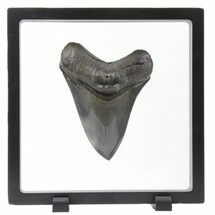This Specimen has been sold.
Fossil Spider and Fungus Gnat in Baltic Amber
This is a 44 million year old fossil spider (order Araneae) and a dark-winged fungus gnat (family Sciaridae) within Baltic amber. This spider is about 2.9mm wide in a 29 x 19 x 5mm piece of amber.
Reminder: Most inclusions preserved in Baltic amber are tiny, typically requiring magnification to appreciate their detail. The product photos were captured using high-powered microscopy to clearly reveal these inclusions up close. A printed copy of the inclusion photo will ship with your order, and we’ll also email you a high-resolution digital file.
About Baltic Amber
Baltic amber is a fossilized tree resin renowned for its clarity, warm golden hues, and especially its well-preserved inclusions, particularly insects and other small organisms. Formed approximately 44-55 million years ago during the Eocene epoch, Baltic amber originates from vast forests that once covered parts of Northern Europe, mainly around the Baltic Sea region. Countries like Lithuania, Poland, and Russia (notably the Kaliningrad region) are known for large deposits of this amber, which erodes from sediment layers and can be found washed up along the shores.
One of Baltic amber's most fascinating features is its preservation of ancient life, offering a detailed snapshot of Eocene ecosystems. Resin trapped insects, spiders, and other small creatures in its sticky substance, protecting their bodies in stunning, three-dimensional detail.
Buyer Beware: The market is flooded with fake amber, which is often plastics with insects embedded in it. The insect inclusions in amber are almost always tiny. Larger insects are able to struggle free and are not preserved. If you see something that looks too good to be true, it often is. Make sure to buy from a reputable dealer.
Baltic amber is a fossilized tree resin renowned for its clarity, warm golden hues, and especially its well-preserved inclusions, particularly insects and other small organisms. Formed approximately 44-55 million years ago during the Eocene epoch, Baltic amber originates from vast forests that once covered parts of Northern Europe, mainly around the Baltic Sea region. Countries like Lithuania, Poland, and Russia (notably the Kaliningrad region) are known for large deposits of this amber, which erodes from sediment layers and can be found washed up along the shores.
One of Baltic amber's most fascinating features is its preservation of ancient life, offering a detailed snapshot of Eocene ecosystems. Resin trapped insects, spiders, and other small creatures in its sticky substance, protecting their bodies in stunning, three-dimensional detail.
Buyer Beware: The market is flooded with fake amber, which is often plastics with insects embedded in it. The insect inclusions in amber are almost always tiny. Larger insects are able to struggle free and are not preserved. If you see something that looks too good to be true, it often is. Make sure to buy from a reputable dealer.
SPECIES
Order Araneae (Spider) & Family Sciaridae (Fungus Gnat)
LOCATION
Kaliningrad, Russia
SIZE
Spider about 2.9mm wide, Amber 29 x 19 x 5mm
CATEGORY
SUB CATEGORY
ITEM
#307674
We guarantee the authenticity of all of our specimens.
 Reviews
Reviews












